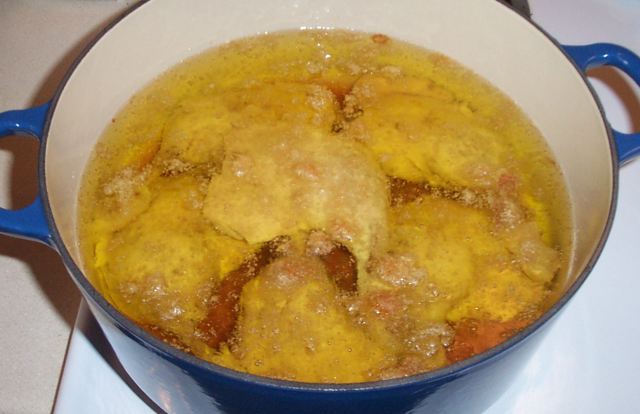Pretending to get ready for winter

It may look as though I've been neglecting this blog of late, but in fact I haven't. Or at least, I have a good excuse: I've been hunting ducks.
Okay, I haven't actually been going out with a gun to shoot them down out of the sky, but I have been prowling all the local grocery stores to find some. I've spent the better part of the last month on a mission to make duck confit, and given that I live in a town with a park devoted to all manner of waterfowl, it's been surprisingly difficult to find ducks.
A week ago Friday, I finally found some Brome Lake ducks at a nearby Sobeys and immediately set to work.
Duck confit is essentially duck (usually the legs, although apparently you can confit the breasts as well) that has been cured with salt, slow cooked in rendered fat (usually duck fat, although you can mix in some lard as well) and then left in the fat, which hardens as it cools, forming a natural seal to keep the air out. This effectively preserves the meat ("confit" is just French for "preserved"). In Charcuterie, the book whose confit recipe I used (although I have at least four others), Michael Ruhlman and Brian Polcyn write:
"Ducks and geese may have been the raison d'être of the confit. When it came time to harvest the foie gras, the valuable fattened liver from specially raised birds, French farmers would have had far more meat than they could eat or sell. Happily, the birds produced extraordinary amounts of fat. So they first cured the meat with salt, then poached it in its own fat and left it to cool submerged in that fat."
This presumably explains why I associate confit so strongly with autumn and winter. Since this is the season for slaughtering the ducks, which would have spent all summer getting fat, it's the right time of year for making and starting to consume confit. Of course, we don't need to preserve meat in fat anymore, since we have freezers and other such modern contraptions, but we continue to do so because it still tastes good. And with preparations as, well, arcane as confit, that sense of its relationship with the season hasn't quite gone away for me. I could have made this recipe at any time of the year, but it's nice to pretend I'm getting ready for a long, cold winter.
When I got my ducks home, they were frozen, so I immediately put them into a sink full of cold water to thaw. Once they were mostly thawed, I transferred them to the fridge to finish thawing overnight. Two days later, I set aside lots of time to work with them. First, I broke them down into legs, boned breasts, fat and carcasses.* The breasts went back into the freezer (something that I'm sure would offend many food safety experts), the legs went into their overnight salt-and-spice cure, the carcasses went into roasting pans en route to the stockpot, and the fat went into a pot to render.
The next day, I rinsed off the duck legs, patted them dry and placed them in my large Le Creuset dutch oven. I took the rendered fat, plus some additional fat I'd bought in Montreal, melted it in a saucepan and poured it over the duck legs. Once I was satisfied they were covered (I had to add a little bit of lard as well), I put them in the oven on it's lowest setting for 6 hours. After that, the fat was clear, the juices were all at the bottom, and the legs were tender. Into the fridge it went. For a week.
Last night was the big night, when I finally pulled the confit out of the fat, cooked it up and ate it. We had a couple of friends over, and served it over a risotto spiked with fresh shiitakes and dried cèpes. In my excitement, I forgot to take any photos, but that's alright, because the plate was entirely monochromatic.
The taste and texture, though, were amazing. Rich, and salty, and meltingly tender. My husband, who had had a bad experience with duck confit in the past, had set out steak knives, but one of our guests rightly observed that you could have eaten it with a spoon.
If this is preparing for winter, I think I can handle the snow.
*Note: To find out more about how I boned the ducks, check out this thread on my new favourite culinary website, Cooks Korner. I haven't yet figured out how the site differs from eGullet, except that there are a lot fewer members, so I get more attention!
